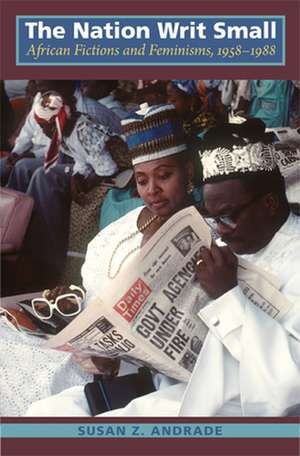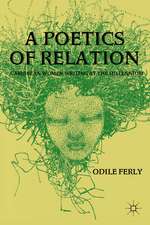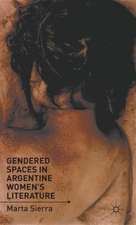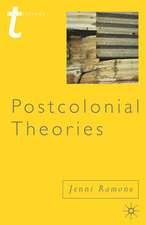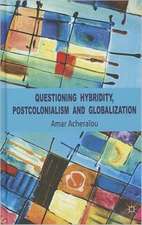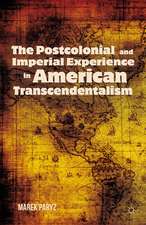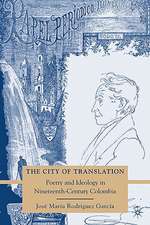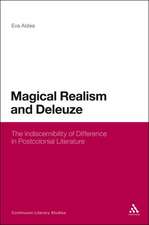The Nation Writ Small – African Fictions and Feminisms, 1958–1988
Autor Susan Z. Andradeen Limba Engleză Paperback – noi 2011
Preț: 259.42 lei
Nou
Puncte Express: 389
Preț estimativ în valută:
49.64€ • 51.54$ • 41.40£
49.64€ • 51.54$ • 41.40£
Carte tipărită la comandă
Livrare economică 24 martie-07 aprilie
Preluare comenzi: 021 569.72.76
Specificații
ISBN-13: 9780822349211
ISBN-10: 0822349213
Pagini: 272
Ilustrații: 1 photograph
Dimensiuni: 153 x 230 x 29 mm
Greutate: 0.34 kg
Editura: MD – Duke University Press
ISBN-10: 0822349213
Pagini: 272
Ilustrații: 1 photograph
Dimensiuni: 153 x 230 x 29 mm
Greutate: 0.34 kg
Editura: MD – Duke University Press
Cuprins
Acknowledgments vii
Introduction 1
1. The Joys of Daughterhood: Achebe, Nwapa, Emecheta 44
2. The Loved and the Left: Sembne, Bâ, Sow Fall 71
3. Bildung in Formation and Deformation: Dangarembga and Farah 114
4. Bildung at Its Boundaries: Djebar, Two Ways 165
Conclusion 202
Selected Chronology of African Novels 209
Notes 213
References 239
Index 253
Introduction 1
1. The Joys of Daughterhood: Achebe, Nwapa, Emecheta 44
2. The Loved and the Left: Sembne, Bâ, Sow Fall 71
3. Bildung in Formation and Deformation: Dangarembga and Farah 114
4. Bildung at Its Boundaries: Djebar, Two Ways 165
Conclusion 202
Selected Chronology of African Novels 209
Notes 213
References 239
Index 253
Recenzii
“The Nation Writ Small is a brilliant work, feminist and literary scholarship of the highest order. It is a superb reading of the relationship between gender and nationalism in postcolonial African literature and culture, based on Susan Z. Andrade’s deep knowledge African texts and cultural politics.” Simon Gikandi, Princeton University
“Susan Z. Andrade brings new levels of nuance and complexity to bear on issues that have preoccupied, if not obsessed, readers of African women writers: Are they feminist? And are they nationalist? Andrade dismantles these questions, studies their component parts, and reassembles them with finesse and insight.”--Christopher L. Miller, author of The French Atlantic Triangle: Literature and Culture of the Slave Trade
"Andrade hopes to change our reception ofAfrican women writers-much in the way that ptominent feminists have recently voiced public critiques about how the work of women writers in the US is published, marketed, and read (they've had the statistics to back them up tha¡ks in part to the organization VIDA, which in 2010 began publishing "counts" on its website, wwwvidaweb.org, of the disparities between the numbers of female and male authors published and reviewed in high-profile venues). As the novelist Meg Wolitzer observed in the Apnl 1, 2012 issue of the New York Times Book Review, "the top tier of literary fiction-where the air is rich and the view is great and where a book enters the public imagination and the current conversation-tends to feel peculiarly, disproportionately male." And¡ade's scholarship reminds us that this top tíer seems to reproduce itself in many different settings and with lasting consequences, wherever you look." Heather Hewett, Women's Review of Books, July 2012
"The Nation Writ Small is a brilliant work, feminist and literary scholarship of the highest order. It is a superb reading of the relationship between gender and nationalism in postcolonial African literature and culture, based on Susan Z. Andrade's deep knowledge African texts and cultural politics." Simon Gikandi, Princeton University "Susan Z. Andrade brings new levels of nuance and complexity to bear on issues that have preoccupied, if not obsessed, readers of African women writers: Are they feminist? And are they nationalist? Andrade dismantles these questions, studies their component parts, and reassembles them with finesse and insight."--Christopher L. Miller, author of The French Atlantic Triangle: Literature and Culture of the Slave Trade "Andrade hopes to change our reception ofAfrican women writers-much in the way that ptominent feminists have recently voiced public critiques about how the work of women writers in the US is published, marketed, and read (they've had the statistics to back them up tha!ks in part to the organization VIDA, which in 2010 began publishing "counts" on its website, wwwvidaweb.org, of the disparities between the numbers of female and male authors published and reviewed in high-profile venues). As the novelist Meg Wolitzer observed in the Apnl 1, 2012 issue of the New York Times Book Review, "the top tier of literary fiction-where the air is rich and the view is great and where a book enters the public imagination and the current conversation-tends to feel peculiarly, disproportionately male." And!ade's scholarship reminds us that this top tier seems to reproduce itself in many different settings and with lasting consequences, wherever you look." Heather Hewett, Women's Review of Books, July 2012
“Susan Z. Andrade brings new levels of nuance and complexity to bear on issues that have preoccupied, if not obsessed, readers of African women writers: Are they feminist? And are they nationalist? Andrade dismantles these questions, studies their component parts, and reassembles them with finesse and insight.”--Christopher L. Miller, author of The French Atlantic Triangle: Literature and Culture of the Slave Trade
"Andrade hopes to change our reception ofAfrican women writers-much in the way that ptominent feminists have recently voiced public critiques about how the work of women writers in the US is published, marketed, and read (they've had the statistics to back them up tha¡ks in part to the organization VIDA, which in 2010 began publishing "counts" on its website, wwwvidaweb.org, of the disparities between the numbers of female and male authors published and reviewed in high-profile venues). As the novelist Meg Wolitzer observed in the Apnl 1, 2012 issue of the New York Times Book Review, "the top tier of literary fiction-where the air is rich and the view is great and where a book enters the public imagination and the current conversation-tends to feel peculiarly, disproportionately male." And¡ade's scholarship reminds us that this top tíer seems to reproduce itself in many different settings and with lasting consequences, wherever you look." Heather Hewett, Women's Review of Books, July 2012
"The Nation Writ Small is a brilliant work, feminist and literary scholarship of the highest order. It is a superb reading of the relationship between gender and nationalism in postcolonial African literature and culture, based on Susan Z. Andrade's deep knowledge African texts and cultural politics." Simon Gikandi, Princeton University "Susan Z. Andrade brings new levels of nuance and complexity to bear on issues that have preoccupied, if not obsessed, readers of African women writers: Are they feminist? And are they nationalist? Andrade dismantles these questions, studies their component parts, and reassembles them with finesse and insight."--Christopher L. Miller, author of The French Atlantic Triangle: Literature and Culture of the Slave Trade "Andrade hopes to change our reception ofAfrican women writers-much in the way that ptominent feminists have recently voiced public critiques about how the work of women writers in the US is published, marketed, and read (they've had the statistics to back them up tha!ks in part to the organization VIDA, which in 2010 began publishing "counts" on its website, wwwvidaweb.org, of the disparities between the numbers of female and male authors published and reviewed in high-profile venues). As the novelist Meg Wolitzer observed in the Apnl 1, 2012 issue of the New York Times Book Review, "the top tier of literary fiction-where the air is rich and the view is great and where a book enters the public imagination and the current conversation-tends to feel peculiarly, disproportionately male." And!ade's scholarship reminds us that this top tier seems to reproduce itself in many different settings and with lasting consequences, wherever you look." Heather Hewett, Women's Review of Books, July 2012
Notă biografică
Descriere
Focuses on the work of Africa’s first post-independence generation of novelists
